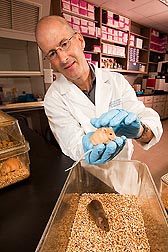How Does Mom’s Nutrition Affect Her Children’s Health?
Epigenetics May Provide New Insights
In some rural villages of the tiny West African nation of The Gambia, food is generally less available during August and September—the peak of the rainy season—than during a typically dry March through May. Now, a study led by molecular geneticist Robert A. Waterland of the USDA-ARS Children’s Nutrition Research Center in Houston, Texas, has shown that functioning of certain genes in kids conceived during the rainy season differs from that in children conceived during the dry season.
The difference may be explained by a relatively new science referred to as “epigenetics.” The variation appears to be permanent, and in the case of two of the five genes in which it was detected, the variation may affect the kids’ risk of certain diseases.
Waterland and coinvestigators have attributed the epigenetic variation to the dramatic seasonal differences in the kinds and amounts of foods available to soon-to-be moms in the days and weeks around the time of conception, or what’s referred to as their “periconceptional nutrition.”
The results of the study are of interest to healthcare professionals involved in improving the prenatal nutrition of these Gambian women, many of whom are, along with other family members, subsistence farmers living at or below the poverty level.
But Waterland’s study is also of worldwide interest to geneticists, because it presents new, unique evidence of nutritional influences on the development of epigenetic mechanisms in humans.
What Is Epigenetics?
Epigenetics means “on or above genetics.” Explains Waterland, “Epigenetic mechanisms don’t change the DNA sequence of genes, but they do cause stable changes in the way genes function.”
|
|
At one time highly controversial, epigenetics is now accepted as likely having a role in human disease, including cardiovascular disorders, type 2 diabetes, obesity, and certain kinds of cancer.
Waterland’s research focused on DNA methylation, an epigenetic mechanism that plays a key role in the development of different cell types in the body. Earlier work with laboratory animals has already shown that establishment of DNA methylation can be influenced by mom’s nutrition before and during pregnancy. Mice born to mothers (dams) fed a diet designed to increase DNA methylation “did in fact have higher DNA methylation levels at certain genes,” Waterland says. Now, his Gambia investigation is the first to show that this influence can occur in humans, too.
DNA in Blood Samples Analyzed
For the Gambia study, small samples of blood from 50 healthy local kids were analyzed to detect differences in the level of DNA methylation at specific regions of certain genes. “Levels of DNA methylation can range from 0 to 100 percent,” Waterland notes.
Using a screening procedure that Waterland developed earlier and improved for this study, the research team showed that levels of DNA methylation of five specific genes were higher in kids who were conceived in the peak rainy season than the levels in the other children.
“DNA regions that show this kind of random, individual-to-individual variation in levels of DNA methylation that can be influenced by mom’s nutrition are called ‘metastable epialleles,’” says Waterland. “In our previous research, with mice, the effect of maternal nutrition on DNA methylation levels was permanent. Because we are seeing this effect in kids whom we tested when they were about 9 years old, we think that the epigenetic effect, established early in their development, will likewise be permanent.”
Of the five genes at which the elevated levels of DNA methylation were observed, two in particular “warrant further study because they are associated with risk of disease,” Waterland says. “Specifically, the SLITRK1 gene is associated with Tourette’s syndrome, and the PAX8 gene is linked to hypothyroidism.”
Farming in a Tropical Savannah
The three villages—Keneba, Kantung Kunda, and Maduar—that were the focus of the periconceptional nutrition research are situated in a tropical savannah ecosystem. “Farmers in these villages have no irrigation, so they must rely on the rains,” says Waterland. “Staple crops like corn, rice, and millet are planted only at the beginning of the rainy season and harvested at the end. Understandably, they may be in very short supply, if not entirely gone, before the next harvest.”
What’s more, the hard labor involved in planting, tending, and harvesting the staple crops “burns a lot of calories, meaning that many villagers are expending more calories than they are taking in,” he says.
“We thought that peak rainy season hunger would lower levels of DNA methylation in children conceived at that time, but we found exactly the opposite. We don’t yet know why that happens, but we have more detailed studies under way that may give us the answer.”
These new studies may also indicate precisely which foods—and nutrients in those foods—resulted in higher levels of DNA methylation in the rainy-season children.
“The best candidates include folate, vitamin B12, betaine, and choline, which were shown to affect DNA methylation in the earlier mouse studies,” says Waterland. “Epigenetics research may help us determine more about the roles that these nutrients and others play in the health of not just these West African kids, but of children everywhere.”
Waterland collaborated in the study with Richard Kellermayer, Eleonora Laritsky, Mark J. Manary, Lanlan Shen, Maria S. Torskaya, and Wenjuan Zhang—all with the Baylor College of Medicine in Houston, where Waterland is an associate professor of pediatrics and of molecular and human genetics; and R. Alan Harris of the college’s department of molecular and human genetics.
Also collaborating were Pura Rayco-Solon and Andrew M. Prentice of the MRC International Nutrition Group, London (United Kingdom) School of Hygiene and Tropical Medicine; Michael Travisano of the Department of Ecology, Evolution, and Behavior at the University of Minnesota-St. Paul; and Jiexin Zhang of the Department of Biostatistics and Applied Biomathematics at the M.D. Anderson Cancer Center at the University of Texas-Houston.
The team’s findings appear in a 2010 peer-reviewed article in PLoS Genetics.
Funding for the study came from ARS and the United Kingdom Medical Research Council, and grants from the March of Dimes Foundation, the National Institutes of Health, and the Curtis and Doris K. Hankamer Foundation.
The Children’s Nutrition Research Center is jointly operated by ARS, Baylor College of Medicine, and the Texas Children’s Hospital.—By Marcia Wood, Agricultural Research Service Information Staff.
This research is part of Human Nutrition, an ARS national program (#107) described at www.nps.ars.usda.gov.
Robert A. Waterland is with the USDA-ARS Children’s Nutrition Research Center at Baylor College of Medicine, 1100 Bates St., Houston, TX 77030; (713) 798-0304.
"How Does Mom’s Nutrition Affect Her Children’s Health?" was published in the March 2013 issue of Agricultural Research magazine.








